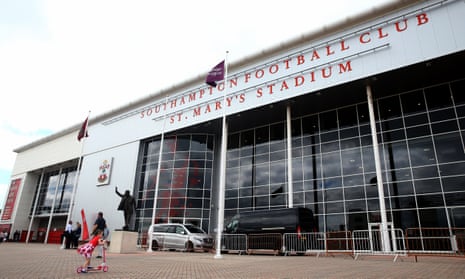Not a lot was known in England about the Chinese businessman Jisheng Gao before he began negotiating to buy Southampton football club last year, and confirmation that he has paid £210m for an 80% stake has been accompanied by familiar Premier League levels of Googling. Of Gao and his company, Lander, nothing greatly notable is revealed, except for reported links to past corruption allegations which the Premier League sought to clarify before allowing him to buy Saints, in a letter leaked to the Sun in April.
Gao was alleged in Chinese media reports to have been implicated in the corruption of Xu Maiyong, a notorious mayor in the booming Xiaoshan province of Hangzhou, who was known as “Xu three more” due to his outsized appetites for money, property and sex. Xu and Jiang Renjie, the vice-mayor of Suzhou, were both convicted of accumulating huge private wealth corruptly and executed by the Chinese authorities on 19 July 2011.
Lander is reported to have issued a statement in response that Gao has never been investigated for improper conduct. The Premier League, 25 years old this month, still has no governing philosophy for who is fit and proper to own one of England’s great clubs, except that they must prove they have the money and not have unspent convictions for offences involving dishonesty or leading to a prison sentence of at least 12 months.
Gao, by definition, has shown he has no such convictions and been cleared to take over, paying Katharina Liebherr the £210m following eight years of sound ownership by her family.
“We have conducted the owners’ and directors’ test which includes detailed background checks on any individual proposing to acquire more than 30% of shares in a club, or to be a director on the club’s board,” a Premier League spokesman said. “This is a very rigorous process and we have worked with Katharina Liebherr and her advisers to ensure all Premier League rules have been adhered to.”
The league’s clubs agreed at their summer meeting two refinements to the rules: that people can be barred in future if they have misled the league during a takeover process, or done something in a foreign country which would have led to a criminal conviction in the UK. That is a recognition of different legal standards around the world and that the ownership of English football clubs is now a fiendishly complex international business.
In Saints’ announcement of the takeover Liebherr rather gushed to fans about “the start of a new and exciting chapter for our club”. The explanation of why, of all the potential buyers in all the world, she had chosen the Gao family, was that: “Mr Jisheng Gao and his daughter, Mrs Nelly Gao, with whom I have built a close relationship, share our values and ambitions.”
The promise is that the Gaos have not just landed on Southampton to profit from Premier League clubs’ rapidly inflating financial value but will invest money themselves to elevate the club further above its remarkable progress under the Liebherrs. Given that the vast £8.4bn TV deals from 2016-19 meant that homely Saints received £122m as their share last season, it will be interesting to watch how much additional investment the Gaos come to believe is really necessary.
They have become the sixth Chinese investor in an English football club since the great rush after the country’s president, Xi Jinping, called in 2015 for an expansion of China’s football power, including a planned hosting of the World Cup.
The president’s injunction was followed by an immediate dash to buy clubs overseas, and by Chinese Super League clubs paying vast fees and wages to attract players including Carlos Tevez and Oscar.
This spending appears to have been slowed after China’s general administration for sport condemned some of it as irresponsible and promised curbs, and the government introduced measures to restrict money flowing out of China for overseas acquisitions.
The Gao family personally, rather than their company Lander, is said to have paid for the 80% stake, using assets already held in Hong Kong, thereby complying with the restrictions in China.
Alvin Ho, a writer on the business of football in China, reports that Lander is predominantly involved in power supply and property development, valued at about £1bn on the Shenzhen stock exchange. Gao’s biography states that he was a policeman for seven years in Shanghai in the 1970s, before the end of China’s “cultural revolution”, then worked in state-owned enterprises before founding the original Lander companies in Xiaoshan in 1995.
Now Liebherr is presenting Gao and his daughter as the ideal people to maintain and build on “the Southampton Way,” whereby the club has risen from League One as recently as 2011 to top-eight finishes in the Premier League in each of the last four seasons. Liebherr inherited the club when her father, Markus, an industrial magnate, died in 2010, having bought Saints out of administration the previous year. She rallied through a turbulent period and fierce public doubts in 2014 after the then chairman, Nicola Cortese, resigned, followed by Mauricio Pochettino leaving for Tottenham Hotspur and sales that summer of Luke Shaw to Manchester United, Adam Lallana and Dejan Lovren to Liverpool and Calum Chambers to Arsenal. Yet they were replaced remarkably successfully and Liebherr and the club’s stated philosophy of “potential into excellence” are now generally viewed with admiration rather than scepticism.
Liebherr will now bank a near £150m profit on the approximately £14m it cost her father to buy the club, and £38m loans converted to shares in 2012-13. It is appropriate she has done so just as the Premier League marks 25 years since its breakaway formation and first deal with BskyB, a reminder to English football of how accustomed we have become to all this.
